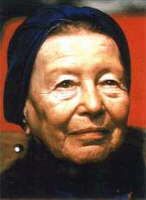Philosophy Pages
| Dictionary | Study Guide | Logic | F A Q s | ||
|---|---|---|---|---|---|---|
| History | Timeline | Philosophers | Locke | |||
Philosophy Pages
| Dictionary | Study Guide | Logic | F A Q s | ||
|---|---|---|---|---|---|---|
| History | Timeline | Philosophers | Locke | |||

|
Life and Works
Bibliography Internet Sources |
Born and educated in Paris, Simone de Beauvoir was among the first women permitted to complete a program of study at the École Normale Supérieure.
Through her lifelong friendship with
Sartre, she contributed significantly to the development and expression of
existentialist philosophy.

In Le Deuxième Sexe
(The Second Sex) (1949), de Beauvoir traced the development of male oppression through historical, literary, and mythical sources,
attributing its contemporary effects on women to a systematic objectification of the male as a positive norm.
 This consequently identifies the female as Other, which commonly leads to a loss of social and personal identity, the variety of
alienation unique to the experience of women.
Her works of fiction focus on women who take responsibility for themselves by making life-altering decisions,
and the many volumes of her own autobiography exhibit the application of similar principles in reflection on her own experiences.
This consequently identifies the female as Other, which commonly leads to a loss of social and personal identity, the variety of
alienation unique to the experience of women.
Her works of fiction focus on women who take responsibility for themselves by making life-altering decisions,
and the many volumes of her own autobiography exhibit the application of similar principles in reflection on her own experiences.
|
Recommended Reading:
Primary sources:
Secondary sources:
Additional on-line information about Beauvoir includes:
|
